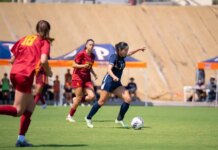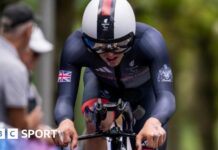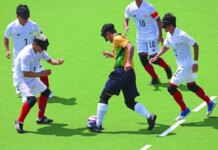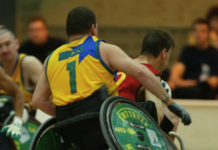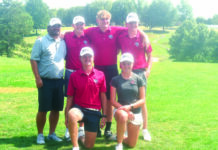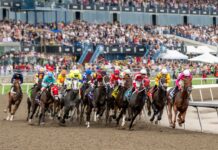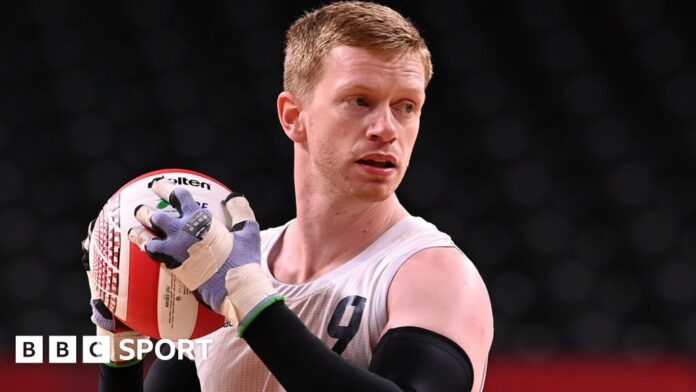16 January 2024
Image source, Getty Images
Image caption, Jim Roberts lost his legs after illness at the age of 19
“I’m a big believer that you have to hit your own rock bottom before you can start to pick yourself up, and my rock bottom was dying.”
British wheelchair rugby legend Jim Roberts is living proof that even after the darkest of hours, the biggest of dreams can come true.
In 2007, aged just 19, Welshpool-born Roberts had both his legs amputated below the knee, a cruel culmination of a life-threatening bacterial meningitis infection.
He did not know it at the time, but this life-changing episode would lead him on a path to Paralympic gold and a place in British sporting history.
Long before his gold medal success at the 2020 Tokyo Games, Williams always had a love of sport, first at school in Brecon and then at Coventry University where he studied architecture technology.
“I loved rugby, played a fair amount growing up. Loved physicality and loved that team sport environment,” Roberts told BBC Sport Wales’ Legends of Welsh Sport series.
“I played for the university rugby team, just a young man coming in to the prime years I guess.
“I’d been back from university for about a week, felt really sick and I was violently ill throughout the night.
“I remember Dad coming to wake me up the next day and I was like ‘I feel rough, you’re going to have to take me to hospital’.”
Initially dismissed by doctors as flu, it soon became apparent that Roberts’ condition was far more serious.
“You end up with very similar injuries to a frostbite victim. The blood is almost starving your fingertips and toe tips,” added Roberts.
“I had 10 days in intensive care in a coma. I pretty much had no skin on my legs below the knee and very little skin on my arms and my hands.
“It was actually me that said that amputation might be the way to go. I had both legs removed just below the knee. I’ve also had my index finger on my left hand amputated.
“It was absolutely devastating. It was crushing and it was a really depressing time of my life.
“I didn’t want to engage and buy into anything. I think my family seeing me was awful. I hadn’t realised what I was doing to them and what they were going through watching me, not eating and not engaging with my care team.
“I was down to about half the weight when I went to hospital and put myself into cardiac arrest.”
After two and half years in hospital, Roberts was discharged and was determined to turn negatives into positives.
“It was actually a nurse that introduced me to wheelchair rugby,” said Roberts.
“I was under the impression that Paralympic sport was more of a participation event, and you just had to turn up. I couldn’t have been further wrong
“Wheelchair rugby was originally called ‘murderball’. It’s a massively brutal sport, the hitting and all of that was a big shock.
“I guess the rest of the population sees you as something that’s a little bit fragile. It’s a big perception changer. I threw myself all in.”
Roberts joined the Marauders wheelchair rugby club in Sheffield and by 2013 was selected for Great Britain’s elite squad.
“It was a really welcoming community and just seeing other people, similar situations to me, was a really good holding on point for me mentally at the time,” added Roberts.
“We were all a core group of players that were coming through from the development team in to the elite team
“I was not ready for international rugby and was made very silly on numerous occasions”.
Moving to America
But it was not long before Roberts would feel at home in his new chosen sport and his talents attracted attention in the United States.
He moved to Phoenix, Arizona to compete on a full-time basis.
“The American league at the time was so much stronger than anywhere else in the world. It was a league I definitely looked up to and wanted to learn from,” said Roberts.
“Three of the guys had won Paralympic medals, two of them had won gold and I was like ‘this is pretty cool’.
“A massive realisation when going to America is how much they relied on systems and patterns and team play and that was something I knew immediately that we could implement at GB”.
Tokyo Paralympics
Prior to the Paralympic Games in Tokyo, delayed by the coronavirus pandemic until 2021, the GB wheelchair rugby team had a reputation of missing out on medals with a series of fourth to sixth placings since 2000.
But team spirit was high in the Covid-quarantined bubble of the athletes village in Japan.
“Tokyo was just really quiet and the Games were so weird because, obviously, we were in the bubble of the village and we were ushered from everywhere,” Roberts said.
“It was a very weird experience being in that bubble with all the restrictions we had.”
A tense semi-final win against Japan guaranteed GB’s first ever medal in the sport, but they faced a daunting final against USA, a team they had already lost to in the group stages.
“I was absolutely buzzing. We’d done what no other GB wheelchair rugby team had done,” said Roberts.
“The bit I hated about playing the most was in the changing room beforehand, kitting up, getting ready.
“Mental strength is something I’ve been lucky to have. It’s something that I was brought up with and a really good family around me and people that I call family now.
“I take courage and strength from them.
“We had massive self -belief in that team that the work was going to pay dividends whether that be a medal or a gold medal.
“I think the USA were scared of losing another gold medal. They put a lot of pressure on themselves.”
Great Britain won by 54-49 with Roberts the standout performer, scoring 24 tries at the Yoyogi National Stadium.
“There were players coming on, hugging each other and going mad, you could see how much it meant,” said Roberts.
“To me it was just a relief that we’d done it, soon after it went from relief to joy. To come away with the medal was amazing
“For wheelchair rugby the pinnacle is a gold medal at a Paralympic games and I’m one of the few people to have reached the pinnacle of their sport and that makes me massively proud.”
Retirement
After achieving that “pinnacle”, Roberts is now retired, enjoying life away from the court and pursuing a career as a Chartered Architectural Technologist.
By his own admission, he is “definitely someone who enjoys the journey more than the destination”.
“The memories and the friends and all of that that goes along with those achievements are what I’ll cherish more,” said Roberts.
“I’m okay with settling for second best if I know I couldn’t have done any better or I know the team couldn’t have done any better.
“Until you’re put in a situation, I don’t believe you know what you’re truly capable of.
“I’ve had some unfortunate things happen to me and I’ve come out the other side of them, but I’m a true believer that the human spirit is an amazing thing and anyone can come out of these situations when they’re put up to it”.
You can watch Legends of Welsh Sport: Jim Roberts here.
Source link : https://www.bbc.co.uk/sport/disability-sport/67997470.amp
Author :
Publish date : 2024-01-16 08:00:00
Copyright for syndicated content belongs to the linked Source.




